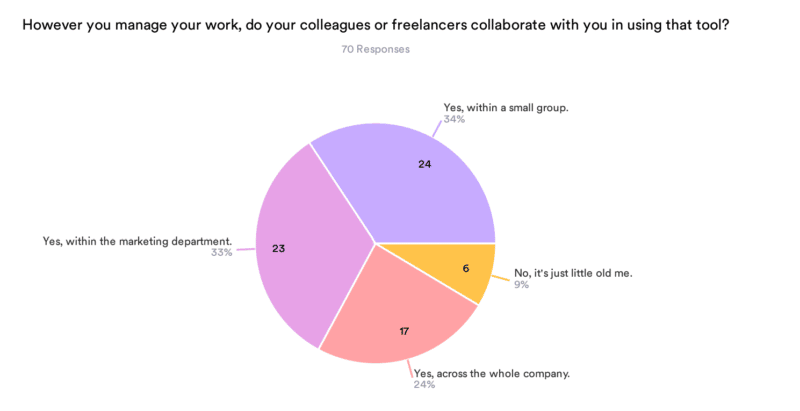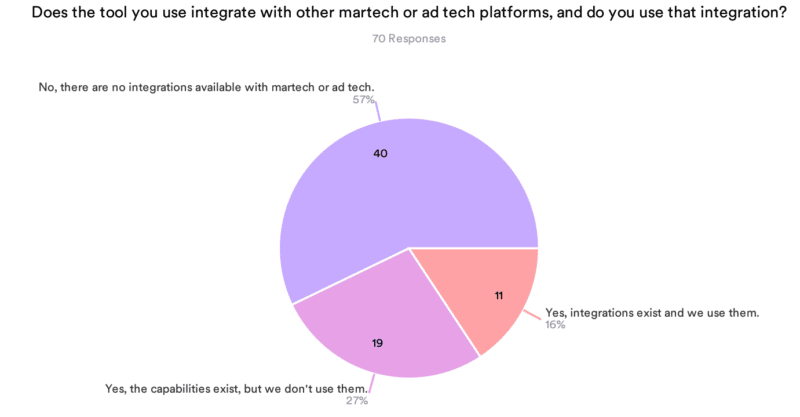Marketing work management: the forgotten essential
MWM platforms handle the everyday tasks, deadlines and communications, helping keep teams on track. Increasingly, they integrate with other martech.
When talking about martech, we most often think about tools that allow us to perform a specific task related to marketing — analyze traffic on our websites, aggregate and understand customer data, deliver personalized messaging, etc.
But most marketing initiatives require we employ multiple tools to achieve our objectives. Just to use one example, we may use Google Doc to write a whitepaper, Canva to create graphics to illustrate it, and something like Adobe InDesign or Acrobat to bring it all together. Then, the asset goes into the marketing automation platform, which integrates with the content management system and other tools that drive traffic to that piece of gated content.
How are marketers tying all this together? Many are using a category of tool that’s undergoing a great deal of change, marketing work management (MWM). Some of the software we looked at in our just-launched MarTech Intelligence Report on the space are all-purpose project management tools, but, increasingly, vendors are adding features specific to common marketing workflows (like proofing and getting approvals on that above-mentioned whitepaper, for example). And some new tools are arising with their sights on agency and marketer customers.
When we conducted an informal survey of our audience earlier this year, 70% of the 71 respondents said they already use a tool like this to manage their daily work, while others use everything from pen and paper to email folders to spreadsheets to Slack or Microsoft Teams to the workflow capabilities of another tool like a CRM, marketing automation platform or DAM.
We also asked marketers whether they collaborated with others within tools, regardless of whether they were primarily working within a dedicated app or whether they used a combination of solutions. Most did collaborate, either across their whole company (24%), within a small group (34%) or within the whole marketing department (23%).

Another trend we looked at is the increasingly connected nature of these tools. Many marketers (43%) reported that their tool already connects to other systems, but our survey indicated that many of these integrations are not yet being employed.


Though we didn’t get enough responses to make this a genuinely representative sample, it’s certainly a window into what’s happening in many marketers’ everyday work lives. With all the innovations coming from vendors, they’re certainly hoping to increase use among marketers.
For more on marketing work management tools, including the trends driving adoption, an analysis of features and profiles of vendors, download our MarTech Intelligence Report, Enterprise Marketing Work Management Platforms: A Marketer’s Guide.
Marketing work management: A snapshot
What it is: Marketing work management platforms help marketing leaders and their teams structure their day-to-day work to meet their goals on deadline and within budget constraints, all while managing resources and facilitating communication and collaboration. Functions may include task assignments, time tracking, budgeting, team communication and file sharing, among others.
Why it’s important today. Work environments have changed drastically due to the COVID-19 pandemic. This has heightened the need for work management tools that help marketers navigate these new workflows.
Marketers have been at work developing processes that allow them to work with those outside their own offices since marketing projects—campaigns, websites, white papers, or webinars—frequently involve working with outside sources.
Also, with marketers required to design interfaces, write content, and create engaging visual assets today, more marketers are adopting agile workflow practices, which often have features to support agile practices.
What the tools do. All of these changes have heightened the need for marketing work management software, which optimizes and documents the projects undertaken by digital marketers. They often integrate with other systems like digital asset management platforms and creative suites. But most importantly, these systems improve process clarity, transparency, and accountability, helping marketers keep work on track.
Related stories